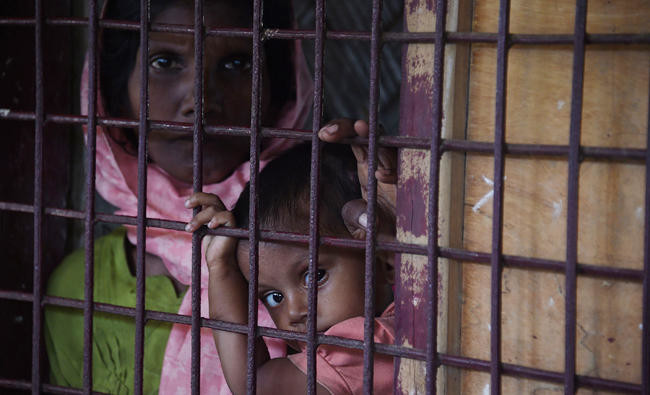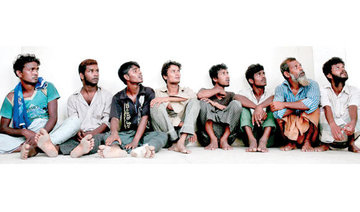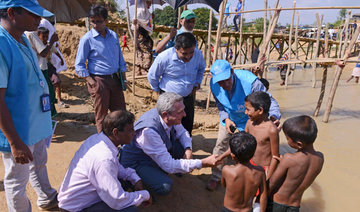DHAKA: Bangladesh will expand a massive settlement under construction in its southernmost district to house 900,000 Rohingya Muslims, a minister said Thursday, putting it on track to rival the world’s largest refugee camps.
Two thousand acres of land in Cox’s Bazar district were set aside last month for a new site to house 400,000 Rohingya who had fled ethnic bloodshed in neighboring Myanmar since late August.
But space has been exhausted as the number of refugees exceeded half a million, putting immense strain on camps along the border that already hosted hundreds of thousands of Rohingya displaced from past violence in Rakhine State.
Mofazzal Hossain Chowdhury Maya, minister for disaster management and relief, said the estimated 8-900,000 refugees would be relocated to the new camp on the fringes of Kutupalong, the largest Rohingya settlement in the area.
“Those who are living in scattered places... would be brought into one place. That’s why more land is needed. Slowly all of them will come,” he told AFP, adding families were already on the move to the new site.
The settlement being built by the army — known as the Kutupalong Extension — would be expanded by 1,000 acres to accommodate the enormous population, Maya said.
He said all refugees living in the 23 camps stretching along the border would be relocated to the new site, and the existing settlements closed. Two have already been shut down, he added.
The project has caused concern among doctors and charities on the ground who fear a disease like cholera could spread quickly through such a congested, overpopulated site.
The refugee crisis — ignited by violence in Myanmar’s westernmost Rakhine State on Aug. 25 — is the fastest and largest flow of people across a frontier since the Rwandan genocide in 1994.
The International Organization for Migration (IOM), the lead UN agency handling the humanitarian crisis, says the situation is “slowly spiralling into a catastrophe of biblical proportions.”
Charities are struggling to feed and shelter the half a million new refugees who have flooded the camps, where cases of diarrhea have doubled in the past week due to poor sanitation.
Mark Lowcock, a UN under secretary general for humanitarian affairs, said the world body would be seeking around $430 million to scale up the relief operation for the destitute Rohingya.
Dhaka allocates land for giant Rohingya camp
Dhaka allocates land for giant Rohingya camp

Israeli strikes kill at least 20 people in Gaza as Trump wraps up his Middle East visit
An Associated Press journalist counted the bodies at the Indonesian Hospital in northern Gaza, where they were brought. Survivors said many people were still under the rubble.
The widespread attacks across northern Gaza come as Trump finishes his visit to Gulf states but not Israel.
There had been widespread hope that Trump’s regional visit could usher in a ceasefire deal or renewal of humanitarian aid to Gaza. An Israeli blockade of the territory is now in its third month.
The Israeli military had no immediate comment on the strikes.
'Want change': in Spain, far right finds support with Romanians far from home

COSLADA: Romania's far-right presidential candidate George Simion has found strong support in a faraway place as he heads for a tense run-off election Sunday: Coslada, a shabby dormitory town outside Madrid with a large Romanian community.
The Spanish town of 80,000 people -- more than 20 percent of them Romanian -- shows the backing Simion has gotten from compatriots abroad, who are poised to help the 38-year-old win against his pro-European rival, Nicusor Dan, the centrist mayor of Bucharest.
At a cafe terrace near Coslada's so-called "Romanians' Square" -- once a meeting place for day labourers looking to be hired by contractors -- several immigrants from the Eastern European country said they had voted for Simion in the first round on May 4.
Simion, a fan of US President Donald Trump and head of the nationalist AUR party, stormed to first place in that vote with his anti-establishment message, taking 40.9 percent.
His margin of victory among the diaspora was even wider: he scored the backing of more than 60 percent of Romanians abroad.
In Spain, he won 74 percent of the vote.
"I want change. And so does everyone back home," said Mioara Mohora as she wrapped salami slices for a customer at the "Economic Market Discount" mini-mart, which was stacked with Romanian products such as pickled vegetables and beer.
Mohora, who is in her 40s and has lived in Spain for eight years, said she decided to cast her absentee ballot for Simion after Romania's constitutional court cancelled the country's initial presidential election last year over claims of Russian interference.
The decision, which came after dark-horse far-right candidate Calin Georgescu unexpectedly topped the first round in November, sparked sometimes violent demonstrations.
Georgescu has been barred from running again.
"It was a protest vote," Mohora said of her backing for Simion.
"They took away our right to vote for the person we actually wanted."
As she weighed minced meat at a nearby Romanian butcher shop, Mihaela Ionescu, 48, said Romanian authorities had "overturned the people's will" with the cancellation of the elections.
Ionescu, who has lived in Spain for two decades, said she did not vote last year or earlier this month, and has no plans to cast a ballot this weekend.
"Romanians are desperate. They are looking for a hero," she said when asked about Simion.
Romania's economy has rallied significantly since the collapse of communism in 1989, but the nation of around 19 million people still grapples with widespread corruption and lower living standards compared to wealthier western and northern European countries.
This has led many Romanians to move abroad. Some 600,000 of them live in Spain, making them one of the largest foreign communities in the country.
Coslada is home to around 17,500 Romanians. Local buses advertise flights to Bucharest, and many shop signs feature both Spanish and Romanian.
The Romanian diaspora is broadly split into two groups, according to the president of the Federation of Romanian Associations in Europe, Daniel Tecu.
"There are those who want to remain anchored in the European Union, who have witnessed Romania's development within the EU and want nothing more to do with Russia," he said.
Simion won votes mainly from the other group: people who are disappointed with the current political class and are "tired of corruption, angry, who don't return to Romania because it's not the country they want", he added.
Florin Padurariu, the owner of Botosani, a Romanian restaurant facing Coslada's train station -- which Simion visited during a tour of Europe ahead of the election -- said "the diaspora used to vote for pro-Europeans, but that's over now".
"I have always voted, but I have always been disappointed," added Padurariu, 55, who said he remained pro-EU and voted for Dan in the first round.
"After 20 years here, you still haven't learned anything? Europe allows you to support your mother, your father and your children, thanks to the money you earn here," he said.
Russia deliberately hit journalists’ hotels in Ukraine: NGOs

- The hotels hit were mostly located near the front lines, the organizations said
- At least 15 of the strikes were carried out with high-precision Iskander 9K720 missiles
PARIS: Russia has deliberately targeted hotels used by journalists covering its war on Ukraine, the NGOs Reporters Without Borders (RSF) and Truth Hounds said on Friday, calling the strikes “war crimes.”
At least 31 Russian strikes hit 25 hotels from the start of Russia’s full-scale invasion in February 2022 to mid-March 2025, the two organizations said in a report.
One attack in August 2024 in the eastern city of Kramatorsk killed a safety adviser working with international news agency Reuters, Ryan Evans.
The hotels hit were mostly located near the front lines, the organizations said.
Just one was being used for military purposes.
“The others housed civilians, including journalists,” said RSF and Truth Hounds, a Ukrainian organization founded to document war crimes in the country.
“In total, 25 journalists and media professionals have found themselves under these hotel bombings, and at least seven have been injured,” they said.
At least 15 of the strikes were carried out with high-precision Iskander 9K720 missiles, they said, condemning “methodical and coordinated targeting.”
“The Russian strikes against hotels hosting journalists in Ukraine are neither accidental nor random,” Pauline Maufrais, RSF regional officer for Ukraine, said in a statement.
“These attacks are part of a larger strategy to sow terror and seek to reduce coverage of the war. By targeting civilian infrastructure, they violate international humanitarian law and constitute war crimes.”
RSF says 13 journalists have been killed covering Russia’s invasion, 12 of them on Ukrainian territory.
That includes AFP video journalist Arman Soldin, who was killed in a rocket attack near the eastern Ukrainian city of Bakmut on May 9, 2023. He was 32.
Taiwan meets with US for tariff talks in South Korea

TAIPEI: The main Taiwan and U.S. trade representatives met in South Korea for trade negotiations, yielding optimism that further talks would lead to reduced U.S. tariffs on Taiwan exports, the island's Vice-Premier Cheng Li-chiun said on Friday.
At a news conference marking Premier Cho Jung-tai's first year in office, Cheng said chief Taiwan negotiator Jenni Yang reported "good bilateral talks" in which both sides shared expectations of future Taiwan-U.S. economic cooperation and continued talks ahead.
The Taiwan government confirmed in a statement that Yang met with U.S. Trade Representative Jamieson Greer at the Asia-Pacific Economic Cooperation's trade meeting on Jeju Island.
"Taiwan is confident it can reach trade balance by increasing purchases from the U.S.," Cheng said, adding that the U.S. is now the top overseas investment destination for Taiwan.
Taiwan was facing U.S. import tariffs of 32% on its products under U.S. President Donald Trump's new tariff policies, before Trump paused the plan last month for 90 days.
Taiwan has since begun tariff talks with Washington, promising to purchase more U.S. goods and invest more in America to achieve more balanced trade.
South Korea set to resume US tariff talks at APEC

- The auto industry accounts for 27 percent of South Korea’s exports to the United States
- Trump announced additional “reciprocal” tariffs of up to 25 percent on South Korean exports last month
JEJU: South Korea is set to resume tariff talks with Washington on the sidelines of a key APEC meeting Friday, an official told AFP, as ministers jostle to meet US Trade Representative Jamieson Greer.
Trade ministers from the top economies that make up APEC are meeting on South Korea’s Jeju Island amid concerns over the global trading system after US President Donald Trump unveiled bombshell levies on most partners last month.
AFP reporters saw ministers scurrying to meet Greer, who has been holding a series of bilateral negotiations.
Among them was Chinese international trade representative Li Chenggang, just days after the two met in Geneva and agreed to slash tit-for-tat tariffs for 90 days.
Greer is also scheduled to meet South Korean Minister of Trade and Industry Ahn Duk-geun on Friday, a South Korean government official told AFP, with Seoul hoping for significant progress in talks to avoid Trump’s steep tariffs.
The two met in late April in Washington, where South Korea proposed a “July Package” aimed at removing tariffs.
South Korea, which recorded a $66 billion trade surplus with the United States last year, behind only Vietnam, Taiwan, and Japan, making it a key target of Trump’s trade bazooka.
Highly dependent on exports, the country has been hit hard by the 25 percent tariffs on automobiles imposed by President Donald Trump in early April.
The auto industry accounts for 27 percent of South Korea’s exports to the United States, which takes in nearly half of the country’s car exports.
Trump announced additional “reciprocal” tariffs of up to 25 percent on South Korean exports last month, but later suspended them until early July.
Seoul aims to leverage the talks with commitments to purchase more US liquefied natural gas (LNG) and offer support in shipbuilding, a sector in which South Korea is a leader, after China.
Earlier Friday, Greer met Chung Ki-sun, the vice chairman of HD Hyundai, which owns South Korea’s country’s largest shipbuilding company.
HD Hyundai said in a statement the gathering marked the first time a US trade representative had met an of South Korea’s shipbuilding industry, adding that discussions covered cooperation with US shipmaker Huntington Ingalls Industries.
Greer is also set to meet the CEO of South Korean shipbuilder Hanwha Ocean, which provides maintenance, repair and overhaul services for US Navy vessels.
Shares of Hanwha Ocean rose nearly three percent on Friday morning, while HD Hyundai Heavy Industries gained as much as 3.6 percent.
















